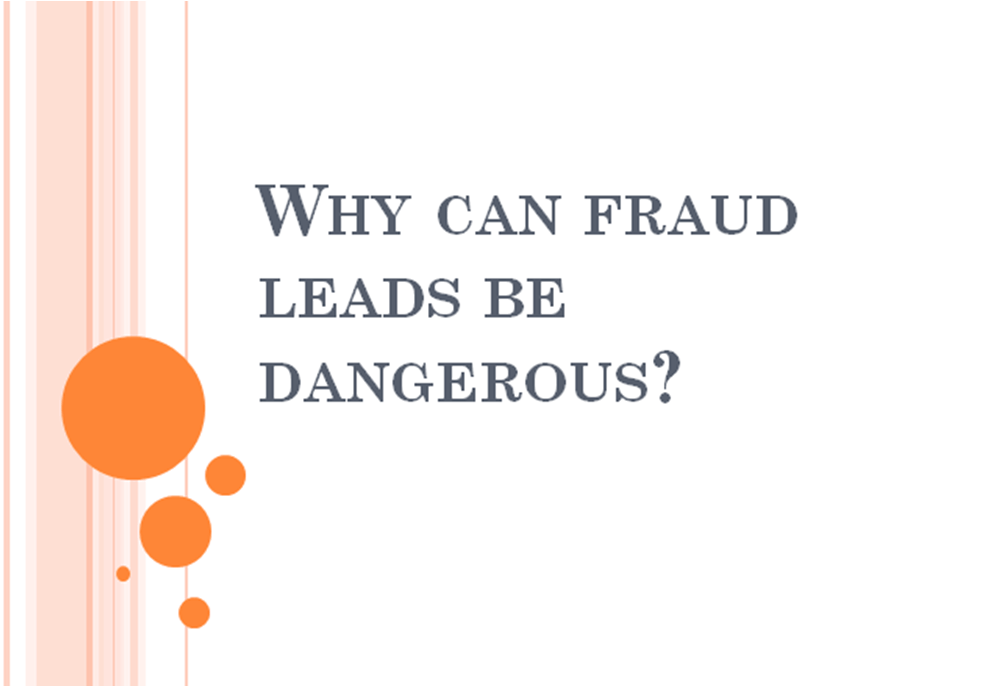Why can fraud leads be dangerous?

source: own elaboration
We often deal with the topic of fraud in online marketing. One of them are fraud leads, and therefore incorrect contact details of potential customers. They are particularly dangerous because the detection that they are false usually takes place after they have been verified and a whole range of negative consequences are associated with handling such contacts. The effects of providing false leads by fraud publishers will be discussed below.
Material losses
Of course, one of the most serious consequences of fraud leads are material losses. If a company uses affiliate marketing and pays for leads, it may fall victim to a fraud publisher. Such publisher provides the advertiser with false data through the chosen affiliate partner, and then requests payment for it. This way, the company may suffer significant financial losses, but we should take into account not only material costs…
Waste of funds and time to handle incorrect data
If the wrong data gets to the company, whether as a result of activities carried out with affiliation partner or through contact forms on its own websites, it is exposed to many negative consequences. Such leads may not be identified at the time of delivery, and in this case they will go to the sales or customer service department as potential customer data. The time employees devote to handling such incorrect leads is a wasted resource of the company, because it could be allocated to contact the person really interested in the company's offer. Other losses that may arise from handling such incorrect data include funds allocated for handling calls, sending e-mails and sms, shipments sent by post, consumption of equipment or costs related to the employment of external companies.
Lower effectiveness of marketing campaigns
If some of the leads obtained as a result of a given marketing campaign turn out to be false, it will be reflected in the effectiveness of this campaign. Many statistics, and above all the conversion rate, will be artificially low. Therefore, part of the company's advertising budget will be wasted, and determining the true effectiveness of the campaign will be very difficult. In addition, this may affect other statistics related to customer service, sales, employee performance, etc.
Brand image at risk
If the data provided in the false leads belong to real persons, but were transmitted without their knowledge, the effects of such fraud can be much more serious. Unaware of this, employees of the company may try to make contact with someone who has not agreed to it, and as a consequence good opinion about a given brand may be threatened. Consumers, even would-be ones, often share information about companies that do not comply with the obligation to have permission to contact. As a result, the brand may gain the opinion of harassing, or in extreme cases even breaking the law, because in the case discussed above, it is even possible to violate the protection of personal data.
Breach of personal data protection
Unfortunately, lead frauds are often associated with violating provisions on the protection of personal data. This can happen if the real data was provided without the consent of the persons concerned. The scammer may own or acquire confidential information and make it available for commercial purposes - and the advertiser unaware of anything will use it in the same way as valid leads. The result of such action may be a violation of the rights of data subjects. To defend itself against allegations, the company must in this case prove that the data was obtained in an appropriate manner and the necessary consents given by the entity to which the information relates. If the company is unable to prove its innocence - it may even face legal consequences.
Problem with determining which lead is fraudulent
Incorrect, and therefore fraud, leads are a serious threat in many different aspects. Fighting them is not facilitated by the fact that their detection is very difficult. If the leads provided by the fraudster are filled with real data, they will not be captured by any checking algorithms. In addition, many intermediaries often participate in the lead acquisition process - finding out which one has used data unlawfully may not be easy. Even if the person responsible for providing fraudulent leads can be traced - it will not be easy to prove such dishonest conduct. Of course, in this case, the company may terminate the cooperation with the fraud traffic provider, but it happens that the fraudulent publisher tries to renew cooperation with the cheated advertiser under a different name, or with the help of a new affiliate partner.
To protect yourself from fraud leads and avoid the negative consequences mentioned above, you should implement the entire security system - monitor sources, use special algorithms to check the correctness of data, collect information about obtained consents, analyze statistics, etc., and it still does not guarantee that acquired leads won't be false. In this area, it is worth using the opinions of experts dealing with the issue of fraud leads (such as TrafficWatchdog.pl).

